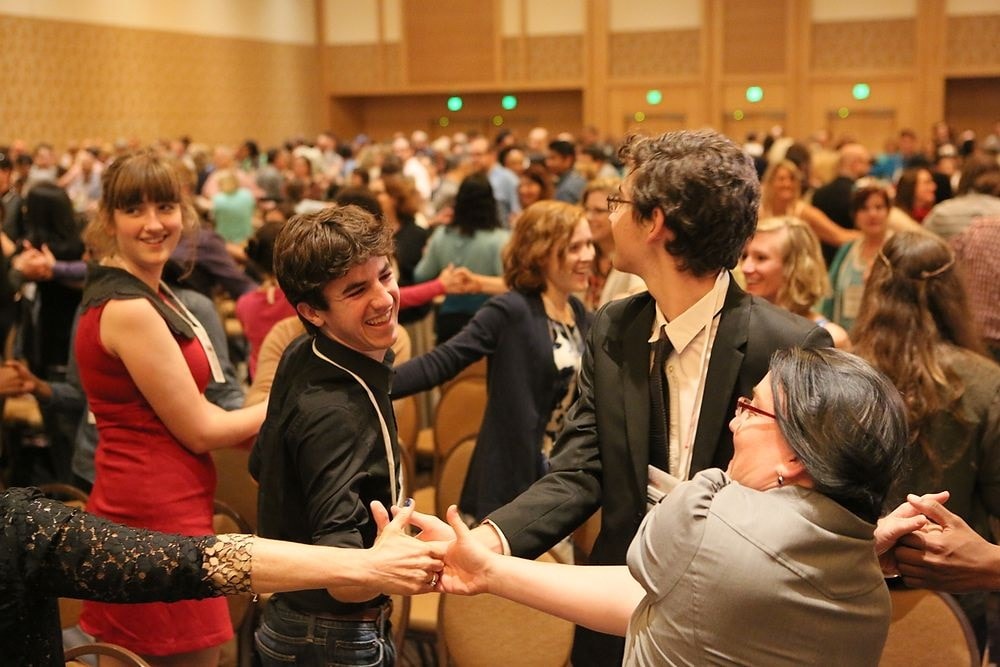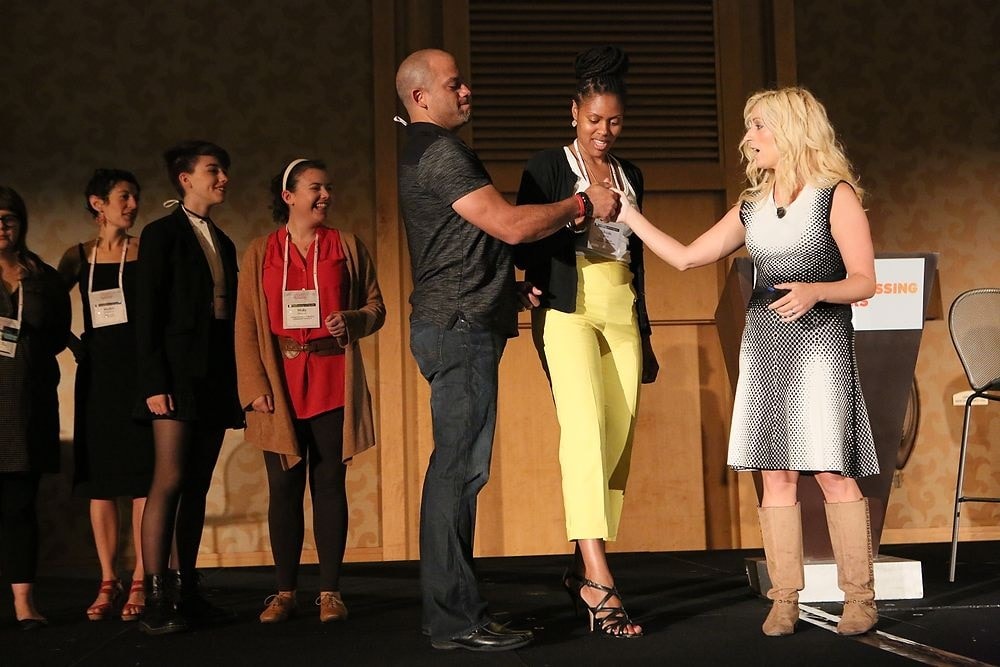From June 19–21, AT’s parent company, Theatre Communications Group, held its 24th annual national conference, titled “Crossing Borders.” Below is AT‘s recap of the second plenary, “Game Design and Theatre” on Friday, June 20, 2014.
“Thank you for getting up so early to take games seriously together,” said Jane McGonigal, the game designer and gaming guru who was the unconventional keynote speaker at today’s opening plenary. McGonigal, the creator of the popular online game Superbetter, and author of Reality Is Broken: Why Games Make Us Better and How They Can Change the World, wasn’t kidding: About halfway through her speech she managed to get all the attendees on their feet to play “massively multiplayer thumb wrestling,” an in-person twist on the online convention of virtual collective gaming, in which players clasped hands in groups of three, four, or more to play the popular schoolyard game. It lasted just a few minutes, but, according to McGonigal, the personal touch increased attendees’ oxytocin levels, which are linked to empathy and fellow feeling. “You have been biochemically primed to like each other and to want to help each other, so if you want to take advantage of networking opportunities, or if there’s a favor you’ve been wanting to ask of someone, now is probably the time.”
McGonigal, a TED Talk-seasoned speaker and one of the more outspoken advocates for the benefits of game-playing, was careful to establish her theatre bona fides at the start: Her degree was in performance studies at Berkeley; she claims she often annoys gaming-focused followers of her Twitter account by plugging live theatre as much as she talks about gaming; and above all she thinks of her live game designs as theatre. From the reaction in the room, she seemed to win over some attendees to the notion of game-playing as an instrument of social change with a beguiling video of U.S. and Mexican citizens joining to turn the border fence into a volleyball net:
She expanded on that notion by pointing to the game’s apparent origin at an international friendship day in Naco, Ariz., in 1979, saying that games can be an “invitation to act differently, to transgress community norms and some social responsibilities,” but within a framework that “tells them what they can do–they don’t have to improvise. There are clear rules. It’s a way to participate without being a performer yourself.”
In fact, getting up and involved, McGonigal made clear with a smattering of brain science, is the only way to reap the cognitive benefits of game play; passive observers don’t get the same thrill of the chase or exultation of triumph at a goal having been completed. And here she may have veered into tougher-to-swallow territory for the non-gaming-enthused in the room. As indicated by her oxytocin comment, and with reference to more of that brain science, McGonigal is a big proponent of “the power of positive emotions to change how we think and act. The more positive emotions we feel, the more determined we are in the face of adversity,” she said, backed by a slide that read “Games make us resilient.” Another slide enumerated 10 positive emotions incited by gaming, including “surprise,” “curiosity,” and above all “creative agency.” And she quoted play theorist Brian Sutton-Smith as saying, “The opposite of play isn’t work; it’s depression.” For McGonigal, the estimated 7 billion online gaming hours spent by people worldwide each week constitute “a resource for artists and activists looking to engage people.”
She gave a striking example of the potential of game design in one she designed for the New York Public Library, “Find the Future,” in which 500 youngsters were locked in overnight to create a book based on clues in the library’s rare document collection. Still, while she may be correct that the “gamer spirit” is “fun, dedicated collective problem-solving,” some attendees might reasonably have wondered whether the hours young people increasingly spend alone at computers and gaming consoles will be translate-able into “IRL” contact–in other words, attendance at theatrical events, participatory or otherwise. In an arguably self-serving closing line, McGonigal dangled an inarguably enticing prospect: “I would like to produce and develop my next game in an American theatre.” Let the oxytocin flow.

The morning’s plenary also included the giving of the National Funder award to the New England Foundation for the Arts, accepted by National Theatre Project’s Quita Sullivan; a reminder from Diane Rodriguez, Center Theatre Group’s new play production director and TCG board member, that one TCG’s “core ideas” is to “serve individuals working in the theatre—not the building, but those that work inside and work outside its confines making work for their communities”; a “screen-shot safari” preview of the new American Theatre website, scheduled for full launch in October, by senior editor Eliza Bent; a welcome by San Diego Rep artistic director Sam Woodhouse, who pointed out helpfully that “the view out there is real”; and a bullish speech by the Old Globe Theatre’s artistic director Barry Edelstein, on a brief break from teching Othello at the theatre, which included his observation that “aesthetically speaking…the American theatre is healthier than at any time in my three decades working in it,” and also included this lovely revisionist creation myth: “On the eighth day, God created narrative. Man’s ability to tell a story is what separates us from the animals. The fact that Old Globe butts up against the San Diego Zoo in Balboa Park is a metaphor for what makes human beings human in the first place.”


